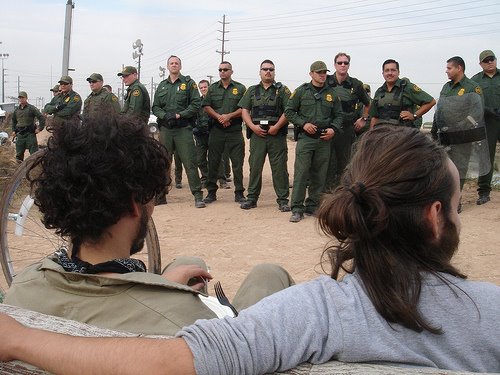By DAN FROSCH
New York Times http://www.nytimes.com/2010/07/30/us/30colorado.html
Published: July 29, 2010
DENVER — In September 2008, a Guatemalan immigrant named Francis Hernandez sped his S.U.V. through a busy Aurora intersection and plowed into a pickup truck, knocking it into an ice cream parlor.
Three people were killed, including a 3-year-old boy.
Mr. Hernandez, as it turned out, was in the country illegally and been arrested more than a dozen times over the years, but had managed to elude deportation.
A task force recommended that Colorado institute a federal background check program called Secure Communities, which helps the authorities check an arrested person’s immigration history through a government database, for possible deportation.
Now, as Gov. Bill Ritter Jr. weighs whether to use Secure Communities, already in effect in 480 jurisdictions in 27 states, immigrant rights groups have been privately pushing him to reject the program. Critics say it promotes racial profiling by the local police and would undermine trust between immigrants and law enforcement, in a state that has particularly strict immigration laws.
“Secure Communities is an overbroad dragnet that will end up destroying communities and families while driving victims and witnesses underground,” said Hans Meyer, policy coordinator for the Colorado Immigrant Rights Coalition.
But officials with Immigration and Customs Enforcement, or ICE, the federal agency that runs Secure Communities, says the program is shoring up a system that has allowed illegal immigrants with criminal records to escape notice.
“It allows ICE and local law enforcement agencies to know as much as possible about people in local custody without any additional costs or procedural changes by local officers,” said Richard Rocha, deputy press secretary for the agency.
Under Secure Communities, created in 2008, people arrested have their fingerprints run through an immigration database, a process that takes only a few hours and is swifter and more efficient than the old method of local law enforcement making referrals to ICE. If they have had prior contact with immigration authorities — like having been previously deported, having been detained or having applied for a work visa — their names will appear in the database and the authorities can place an immigration hold on them.
Congress has allotted $550 million to pay for the program so far, and Janet Napolitano, the homeland security secretary, said she wants it available to every law enforcement agency by 2013.
Nearly three million people have been screened since the program’s debut in Harris County, Texas, in October 2008, through June of this year.
Of those, 39,054 were identified as having committed violent crimes like rape, murder and assault, and 9,831 have been deported. Of an additional 223,752 people who had committed less serious offenses, ranging from property crimes to misdemeanors, 24,805 were deported.
Mr. Rocha says the priority is finding violent criminal illegal immigrants. But critics say that most illegal immigrants identified by Secure Communities have committed low-level offenses and that the program is like an immigration sweep.
Bridget Kessler, a teaching fellow at Benjamin N. Cardozo law school at Yeshiva University in New York said the Obama administration was acting hypocritically by pushing for Secure Communities.
“It seems that the administration is speaking out of both sides of its mouth: standing strong to condemn state-imposed ICE and local partnerships in the context of Arizona, and quietly but forcefully, and on a much larger scale, promoting similar state-imposed ICE and local partnerships nationwide,” Ms. Kessler said.
Cheryl Little, executive director for the Florida Immigrant Advocacy Center in Miami, said: “ICE claims, as it has done for years, that it is targeting dangerous criminals. Yet the program screens the fingerprints of anyone arrested by local police, not just those convicted of crimes.”
Florida is one of three states that have carried out the program statewide (Virginia and Delaware are the others).
Lt. Michael Lindsay, with the Harris County Sheriff’s Office, said the program was effectively ferreting out illegal immigrants. “You’re being deported for being in the country illegally,” Lieutenant Lindsay said. “The crimes bring them to our attention. And the more heinous the crimes just gets them a front seat.”
Opinion on Secure Communities is divided among law enforcement in Colorado.
Keith Ikeda, the police chief of Basalt, a small mountain town with a sizable Hispanic population, said, “If we start talking about misdemeanor arrests and traffic infractions, then I believe it erodes the public trust.”
But Lance Clem, a spokesman for the Colorado Bureau of Investigation, which supports the program, predicted it would discourage racial profiling because everyone is subject to the same background check.
There is also the issue of the program accidentally ensnaring victims of crimes, particularly domestic violence, where the perpetrator can be unclear.
Domestic violence and immigrant rights’ advocates in Colorado have said that those arrested for domestic violence should not be subject to a Secure Communities screening until they are convicted, and that the program should exempt victims of crimes.
Mr. Ritter, a Democrat who is not seeking a second term, has not indicated whether he will sign on for the program.
Lost in the debate over the issue is the fact that Secure Communities would not have identified Mr. Hernandez, who was sentenced to 60 years in prison for vehicular homicide, had it been operating at the time, according to ICE.
Because Mr. Hernandez came into the country as a child and used multiple aliases to avoid deportation, ICE said, he was never referred to immigration officials despite his many arrests.

No comments:
Post a Comment